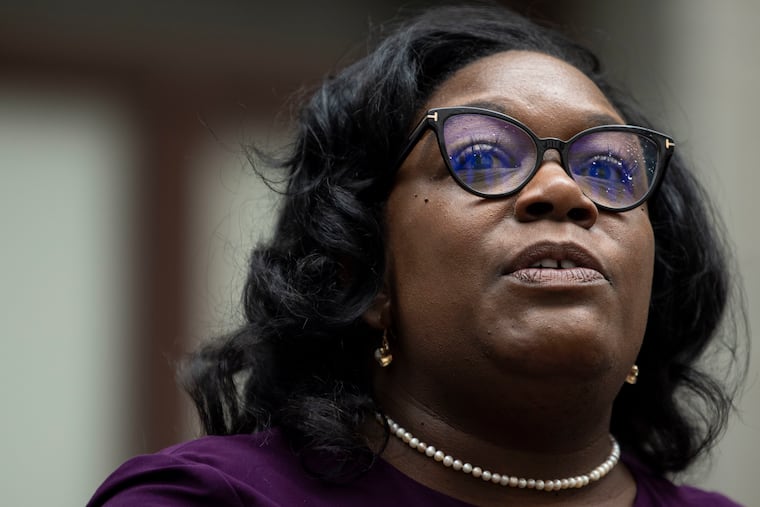City Council voted to require Philly employers to offer paid leave for COVID-19 absences through 2023
Public dust-ups are rare in Council, where members usually settle disagreements behind closed doors. The debate over COVID leave was an exception.

A City Council bill requiring many Philadelphia employers to provide workers with paid leave for absences related to COVID-19 sparked a fierce debate about its potential impact on small businesses before being approved Thursday in a 12-4 vote.
The legislation, sponsored by Councilmember Kendra Brooks, requires employers with 25 or more workers to offer up to 40 hours of paid leave if they are experiencing COVID-19 symptoms, need to self-isolate after being exposed, or have to care for coronavirus-positive family members, among other circumstances.
There is currently no city-required paid COVID-19 leave for workers, after a previous iteration of Brooks’ measure expired in June 2021. Brooks’ new bill reinstates that policy, which affected only firms with 50 or more workers, and extends it to more employers. It will stay in effect until the end of 2023.
“With many other protections being phased out, we must ensure that we are not sacrificing our workforce for the sake of convenience or profit,” Brooks said in a statement. “This is a victory for low-wage workers across the city who can now go into work with the peace of mind that they will never have to choose between staying home sick with COVID-19 and being unable to make rent or coming into work sick.”
Still, Brooks, a member of the progressive Working Families Party, found herself on the defensive at Thursday’s meeting, with other members questioning everything from whether the bill could force small firms out of business to whether she properly circulated research on the bill to her colleagues.
Much of the debate centered on the provision that exempts all businesses with fewer than 25 workers, which will impact about 3,000 companies. Brooks had initially proposed applying the requirement to firms with 10 or more workers, but she amended the threshold to 25 last week after pushback from other Council members, some of whom supported a 50-worker threshold.
“Philadelphia is on the brink of recovery, the brink, and this legislation will be yet another reason why employers will choose to either leave the city or locate elsewhere,” Councilmember Allan Domb said.
The federal government required paid leave for many workers during the first nine months of the COVID-19 pandemic in 2020, fully funded through a payroll tax credit. But the measure expired and was not renewed.
Brooks said the 25-employee cutoff exempts 85% of Philly employers, which she said means small businesses and Black- and brown-owned businesses, which on average have fewer employees, will be protected. A 50-employee threshold, she said, would exempt 94% of employers, making it too limited to help many workers.
Public dust-ups are rare in Council, where members usually settle disagreements behind closed doors before presenting a more polished front publicly. Thursday’s debate was an exception, with several members, including some who ended up voting for the bill, raising concerns about it during the virtual meeting.
Council’s two Republicans, David Oh and Brian O’Neill, were joined by two Democrats, Domb and Derek Green, in opposing the bill. Green, a lawyer, and Domb, a real estate magnate, are known as business-friendly Democrats, and both are rumored to be eyeing the 2023 mayoral race.
Also Thursday, Council approved legislation by Green that allows the city to create a new quasi-governmental entity called the Philadelphia Public Financial Authority, which Green hopes will offer loans to disadvantaged businesses, especially Black- and brown-owned firms that often struggle to obtain credit.
“The lack of access to credit, which has been reiterated by numerous small business owners of color, as their biggest challenge and the greatest impediment to their ability to grow and thrive, was the basis for the legislation that was passed today,” Green said in a statement.
Council voted 15-1 to approve the bill, with O’Neill in opposition.
Green has for years worked to create a public bank in Philadelphia that would hold and invest city money, instead of keeping the city’s funds in accounts at private banks. But he has run into limitations in state law, concerns that a public bank would be unduly influenced by political pressures, and skepticism about whether existing entities, like certified community development financial institutions, are better tasked to do the job.
Green is hoping that creating the Financial Authority is the first step to establishing a public bank.
But it’s unclear if the city will take this first step anytime soon, if ever. Although Council has approved of the plan to create the authority, it is up to Mayor Jim Kenney’s administration to execute the plan, and city officials have already expressed skepticism over the proposal.
Finance Director Rob Dubow previously testified to Council that while administration officials “resoundingly support the broad policy aims outlined in the bill ... we are not sure how it will address those important issues in ways that existing entities cannot.”
Asked Thursday if the administration would proceed with establishing the authority now that the bill has passed, Kenney spokesperson Kevin Lessard said the city is still reviewing the legislation.